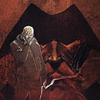today i finished a quest in skyrim that could be considered epic. the aetherium forge quest line. it was long: find 5 locations, clean out 4 dungeons, fetch 4 items. it was hard: 4 dungeons, 3 boss battles, one super boss battle. and it was sort of grand scale: unique bosses, lots of high level drauger (my character is about 45th level), and a unique magic item at the end.
nice to have things included a good backstory, extensive dialog with voice over, and some settings on a grand scale (such as the forge) - IE impressive looking locations. the director john ford, famous for epic westerns used monument valley for many of his films. and cecil b demille, famous for his epic films, often used extremely large and lavish sets with hundreds or thousands of extras.
the main quest line in skyrim could also be considered epic. its long, hard, and rather grand scale, what with elder scrolls, travelling to soverngard, and stopping alduin from destroying the world, and all that jazz.
Thats an interesting approach to take TES into account. I have played Skyrim (and propably the other TES's) for over 160 hours each. The backstory of Skyrim in my thought was a bit oldscool. There was a tyrant, people get rid of it, it returned and made evil things again, people go and fight for him (where I also anticipated with both sides the North and the others). Sure it was big scaled, long and partialy boring to travel from one location to the other but this wouldnt make it epic automaticaly. It is more the kind of a main quest to be big scaled and long (remembering the deadra fight in Oblivion before the big boss crushed the capital city) but does this imply that all main quests are epic?
The aetherium forge was a very interesting quest I have done with pleasure in Skyrim too but here it wasnt the loot or boss fights or even the location (yeah the 400ds dwemer ruins -.-) but the colaborating character Katria and her back story that made this quest interesting and the finaly loot something unique (for me). I feeled sad as she was gone because I liked her from the wide mass of characters most in Skyrim additionaly to the Vampire DLC NPC.
The world of TES lives from such quests and unique characters with individual story but what bout other games (maybe from Bethesda)? Fallout 4 has had some interesting quests and a more or less unique main story but the most epic moment here was getting into the Institute and the quest of buildg that mashine to do so or conquer the castle. Anything else seemed very similar and repetitive. So not epic to me.
What about something like Doom 3, does such games cant have epic parts at some point (even without "quests")?





